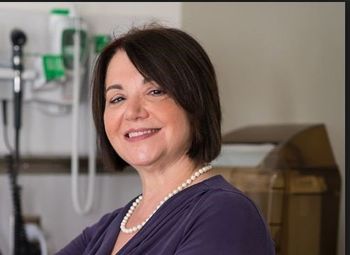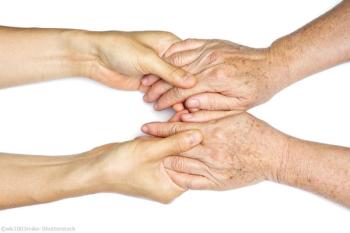
- ONCOLOGY Nurse Edition Vol 25 No 10
- Volume 25
- Issue 10
Elder Spousal Grief in the Context of Cancer Caregiving
Dying from cancer is predominantly an elder experience. The person with major responsibility to provide care for the ill family member is often the patient’s spouse, who frequently is an older adult.
Dying from cancer is predominantly an elder experience. The person with major responsibility to provide care for the ill family member is often the patient’s spouse, who frequently is an older adult.[1] In fact, spouses are not only the most common primary caregivers but they also are often the sole caregivers. An estimated 60% to 80% of elder-focused home care is provided by elderly spouses,[2] who frequently assume the burden of caregiving alone. The death of a spouse or significant other may follow an extensive and psychologically draining period of caregiving, and the caregiver can experience physical and emotional consequences of this stress during both active caretaking and bereavement.[3–6]
Death of a spouse is one of the most stressful life events.[7] Older spouses may have their own health problems, and these frequently are neglected during times of active caretaking. Since women generally outlive their spousal partners, the challenges for this cohort of older widows within the cancer experience require more in-depth investigation.[ 8] Conjugal loss secondary to cancer may be particularly stressful due to the physical demands of caregiving related to the patient’s functional deterioration, symptom burden, and compromised quality of life. The emotional sequelae of caretaking may emanate from distress associated with anticipating the death of one’s life partner, angst over perceptions of suffering, and anxiety over assuming new roles and living on without one’s spouse.
Grief is as unique as one’s fingerprints. No two people grieve similarly, and the trajectory of sadness and mourning is very personally configured. A complex host of factors has been noted to affect the grief response. Some of these variables include the nature of the relationship to the deceased (ie, spouse, adult child, grandparent), age of the deceased, longevity of the relationship, context of the loss (ie, sudden vs anticipated death), degree of caregiving burden, nature of communication pre-death, quality of the marital relationship and family style (ie, harmonious, conflictual), presence of cumulative grief, and the availability of supportive relatives and friends.[9–12]
Contemporary findings regarding grief reactions have relevance to oncology nurses’ concern about the welfare of elderly bereaved spouses.
TABLE 1
Proposed Criteria for Prolonged Grief Disorder
A new paradigm has evolved that depicts the majority of the bereaved adults (80%) as being able to transcend their grief on their own, without the need for formal counseling or therapy. A minority (20%) of the bereaved, however, can experience pathologic emotional corollaries that require professional intervention. A diagnosis of prolonged grief disorder (PGD) is being proposed for inclusion in the next version of the Diagnostic and Statistical Manual of Mental Disorders (DSM-V) to address this complicated variety of the grief response.[13]
While many of the criteria identified in
Although most bereaved individuals will ultimately adapt to their loss more or less successfully, a significant, identifiable minority will experience chronic and disabling grief, with both a personal and societal toll.[14] By knowing and working with families for extended periods of time, oncology nurses can be sensitized to early signs and symptoms of PGD, and have a heightened awareness of its risk factors. Oncology nurses should be aware of these new criteria so that they can refer family members of concern to team members with psychological expertise.
This article is part of a new ongoing series addressing nursing care of the older adult with cancer.
References:
References1. Holtslander LF, Bally JM, SteevesML: Walking a fine line: An explorationof the experience of finding balance forolder persons bereaved after caregivingfor a spouse with advanced cancer. Eur JOncol Nurs 15(3):254â259, 2011.
2. Beery LC, Prigerson HG, BierhalsAJ, et al: Traumatic grief, depression andcaregiving in elderly spouses of the terminallyill. OMEGA 35(3):261â279, 1997.
3. Burton AM, Haley WE, Small BJ:Bereavement after caregiving or unexpecteddeath: Effects on elderly spouses. Aging Ment Health 10(3):319â326, 2006.
4. Kowalski SD, Bondmass MD: Physiological and psychologicalsymptoms of grief in widows. Res Nurs Health 31(1):23â30, 2008.
5. Stroebe M, Schut H, Stroebe W: Health outcomes of bereavement. Lancet 370(9603):1960â1973, 2007.
6. Holtslander LF: Caring for bereaved caregivers: Analyzingthe context of care. Clin J Oncol Nurs 12(3):501â506, 2008.
7. Carr D, House JS, Wortman C, et al: Psychological adjustmentto sudden and anticipated spousal loss among olderwidowed persons. J Gerontol B Psychol Sci Soc Sci 56(4):S237âS248, 2001.
8. Holtslander L, Duggleby W: The psychosocial context ofbereavement for older women who were caregivers for a spousewith advanced cancer. J Women Aging 22(2):109â124, 2010.
9.Ott CH, Lueger RJ, Kelber ST, et al: Spousal bereavementin older adults: Common, resilient, and chronic grief with defining characteristics. J Nerv Ment Dis 195(4):332â341, 2007.
10. Jonasson JM, Hauksdottir A, Nemes S, et al: Couples’communication before the wife’s death to cancer and the widower’sfeelings of guilt or regret after the loss: A population-basedinvestigation. Eur J Cancer 47(10):1564â1570, 2011.
11. Brazil K, Bedard M, Willison K: Bereavement adjustmentand support among caregivers. J Ment Health Aging 9(3):193â204, 2003.
12. Barry LC, Kasl SV, Prigerson HG: Psychiatric disordersamong bereaved persons: The role of perceived circumstancesof death and preparedness for death. Am J Geriatr Psychiatry 10(4):447â457, 2002.
13. Craig L: Prolonged grief disorder. Oncol Nurs Forum 37(4):401â406, 2010.
14. Prigerson HG, Horowitz MJ, Jacobs SC, et al: Prolongedgrief disorder: Psychometric validation of criteria proposed forDSM-V and ICD-11. PLoS Med 6(8): e1000121, 2009.
Articles in this issue
over 14 years ago
News of Noteover 14 years ago
Integrative Medicine Conference Calendarover 14 years ago
Suggested Reading for a Geriatric Oncology Nursing Journal Clubover 14 years ago
The Complexity of Hereditary Cancer Syndromesover 14 years ago
Coenzyme Q10over 14 years ago
Our 9/11 Cancer Nursing Connectionover 14 years ago
October Is National Breast Cancer Awareness Monthover 14 years ago
Counseling Women at High Risk of Ovarian or Endometrial CancerNewsletter
Stay up to date on recent advances in the multidisciplinary approach to cancer.




































